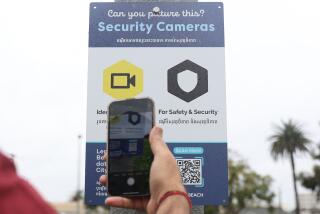Let’s Hear It for Busybodies
- Share via
The other day a mass solicitation was sent to those of us in the newspaper business. An enterprising company offered to sell software that allows photojournalists to digitally encrypt their pictures for transmission from the scene of an event to editors back home.
I scratched my head. What were these techno-heads thinking?
Photojournalists need secret codes the way my cat needs bedroom slippers. More or less extraneous, if you see what I mean. Just what, you might ask, do news photographers have to hide?
Times of crisis allow us to recalibrate what is important and what is trifling. And right now, two powerful social imperatives are on a collision course: our new and urgent desire to be protected from terrorism and our old desire to be protected from snoops.
Before the Sept. 11 terrorist attacks, Americans had become paranoid, obsessed with privacy. The Chicken-Littles were hopelessly confusing simple privacy rights with perceived “rights” of secrecy, and worse, anonymity.
It seems to me that the only photographers who might need encryption are terrorists, who want to transmit pictures back to headquarters after they case their next targets.
Maybe we need to get a grip on ourselves. Let’s take a step back from the swirling civil liberties issues provoked by terrorism and begin with a more personal question: Just what is it that we’re so desperate to keep to ourselves?
Our finances? We have things pretty much backward in our desire to keep the lid on our personal finances. We’d be better off, on balance, if our finances were public.
Just how much do our colleagues earn anyway? In practically every office there are salary disparities that have nothing to do with performance or responsibility and everything to do with favoritism, sexism, luck or timing.
The people with an investment in keeping our salaries secret are our employers. Nothing would drive up salaries faster than if we knew that the slacker down the hall earns twice as much as we do. Just look at how baseball players, actors and CEOs have benefited by knowing what the market will bear.
Our buying habits? If we purchase a book from Amazon.com , we worry that some sinister computer is going to discover what kind of books we like and then entice us to buy them.
Personally, I don’t buy many books online. But I would if a computer could take my recent purchases of Joseph Conrad’s collected works, a volume on Northwest native bone fishhooks and a how-to manual on 12-volt wiring and correctly predict that I also would enjoy reading “Kitchen Confidential.”
Yes, the amassing of data about our buying habits makes for more marketing ploys that intrude on our lives. But we can eliminate the pester factor directly by restricting how and when marketers can ask for our attention.
Our vices? Oh dear, our bosses are tracking our e-mail and our movements. So what’s new? Most employers have policies against surfing the Internet for porn or writing novels while at work.
Should we insist on the right to do so in the name of privacy?
A commentator recently warned that snoops who follow credit-card transactions would be interested to learn if you purchase condoms or a pregnancy-testing kit. I wonder if he wears a disguise when he goes out to get his? Otherwise, a neighbor or co-worker might happen by and wonder: If both products are in the man’s basket, isn’t he late buying one of them?
What I’m saying is that lascivious gossip arises from those we know, not from strangers.
Our medical records? Again, here’s a case where the people who can do us damage--our insurance companies and employers--already have access to what they want. There is too much money at stake and too many chances for mischief for more privacy laws to truly protect us. A better answer is to establish a health care system that doesn’t try to weed out those who need it.
Meanwhile, if you don’t want your lover to know that you are HIV-positive, well, this isn’t privacy worth protecting.
Our identities? Identity theft is a living nightmare. Yet most of us willingly give up our bank account number, our telephone number, our driver’s license number, a credit card number and our address every time we write a check. Just how much more does a thief need?
I think it is likely that added privacy protections would backfire and make it far harder to locate and stop identity thieves and others with criminal intent. People with something to hide are the ones who need “privacy” the most.
Frankly, I think we’d be more content with a small-town approach to privacy. Figure that everybody’s a busybody. Presume that we’ve got very little that we can keep private and act accordingly.
And when a stranger with wads of cash wants to buy an encryption device to transmit photographs of U.S. suspension bridges, we might think to ask, why?






